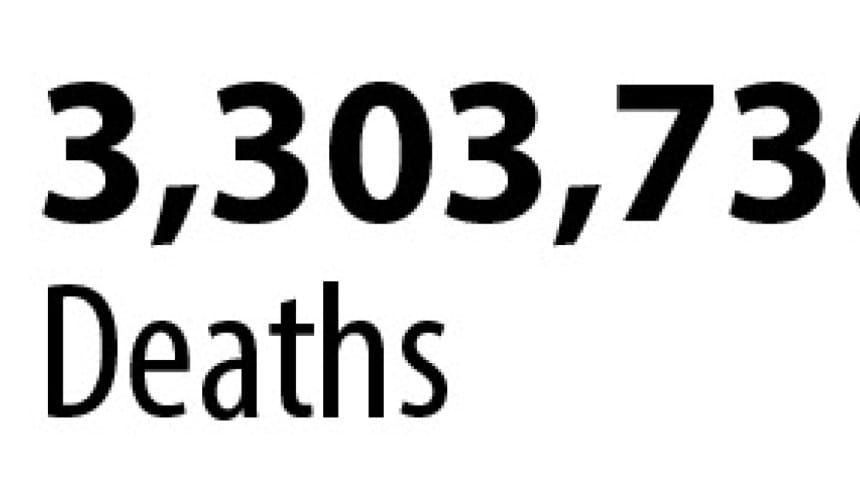Covid Variant in India: It may be evading vaccine protections
A Covid-19 variant spreading in India is more contagious and it is feared it could be dodging some vaccine protections, contributing to the country's explosive outbreak, the World Health Organization's chief scientist said.
In an interview with AFP on Saturday, Soumya Swaminathan warned that "the epidemiological features that we see in India today do indicate that it's an extremely rapidly spreading variant".
Covid-19 cases and deaths have been hitting records every two or three days. Deaths rose by more than 4,000 for a second consecutive day yesterday.
New Delhi has struggled to contain the outbreak, which has overwhelmed its healthcare system, and many experts suspect the official death and case numbers are a gross underestimate.
Swaminathan, an Indian paediatrician and clinical scientist, said the B.1.617 variant of Covid-19, which was first detected in India last October, was clearly a contributing factor to the catastrophe unfolding in her homeland.
"There have been many accelerators that are fed into this," the 62-year-old said, stressing that "a more rapidly spreading virus is one of them".
The WHO recently listed B.1.617 -- which counts several sub-lineages with slightly different mutations and characteristics -- as a "variant of interest".
But so far it has stopped short of adding it to its short list of "variants of concern" -- a label indicating it is more dangerous than the original version of the virus by being more transmissible, deadly or able to get past vaccine protections.
Several national health authorities, including in the United States and Britain, have meanwhile said they consider B.1.617 a variant of concern, and Swaminathan said she expected the WHO to soon follow suit.
"B 1.617 is likely to be a variant of concern because it has some mutations which increase transmission, and which also potentially could make (it) resistant to antibodies that are generated by vaccination or by natural infection," she said.
But she insisted that the variant alone could not be blamed for the dramatic surge in cases and deaths seen in India, pointing to "huge social mixing and large gatherings" in recent months.
'TAKING OFF VERTICALLY'
"In a large country like India, you could have transmission at low levels, which is what happened for many months," Swaminathan said.
"It was endemic (and) probably gradually increasing," she said, decrying that "those early signs were missed until it reached the point at which it was taking off vertically."
"At that point it's very hard to suppress, because it's then involving tens of thousands of people and it's multiplying at a rate at which it's very difficult to stop."
While India is now trying to scale up vaccination to rein in the outbreak, Swaminathan warned that the jabs alone would not be enough to gain control of the situation.
She pointed out that India, the world's largest vaccine-making nation, had only fully vaccinated around two percent of the 1.3 billion-plus population.
"It's going to take many months if not years to get to the point of 70 to 80 percent coverage," she said.
"The more the virus is replicating and spreading and transmitting, the more chances are that... mutations will develop and adapt," Swaminathan said.
"Variants which accumulate a lot of mutations may ultimately become resistant to the current vaccines that we have," she warned.
Meanwhile, India's defence ministry said yesterday it will recruit hundreds of former army medics to support the overwhelmed healthcare system.
Some 400 medical officers are expected to serve on contract for a maximum of 11 months, the ministry said in a press release, adding that other defence doctors had also been roped in for online consultations.
Many Indian states have imposed strict lockdowns over the past month while others have announced restrictions on public movement and shut down cinemas, restaurants, pubs and shopping malls.
But pressure is mounting on Prime Minister Narendra Modi to announce a nationwide lockdown as it did during the first wave last year, reports Reuters.
The Indian Medical Association (IMA) called for a "complete, well-planned, pre-announced" lockdown instead of "sporadic" night curfews and restrictions imposed by states for a few days at a time.
New cases in the country rose by 403,738, just shy of the record and increasing the total since the start of the pandemic to 22.3 million.
With an acute shortage of oxygen and beds in many hospitals and with morgues and crematoriums overflowing, experts have said the actual numbers for Covid-19 cases and fatalities could be far higher than reported.
The world's largest vaccine producing nation has fully vaccinated just over 34.3 million, or only 2.5%, of its 1.35 billion population as of yesterday, according to data from the government's Co-WIN portal.
Support has been pouring in from around the world in the form of oxygen cylinders and concentrators, ventilators and other medical equipment.
Emirates airline said yesterday it will fly medical supplies from Dubai to nine cities in India free of charge from this week to help battle a devastating upsurge in the coronavirus.


 For all latest news, follow The Daily Star's Google News channel.
For all latest news, follow The Daily Star's Google News channel. 



Comments